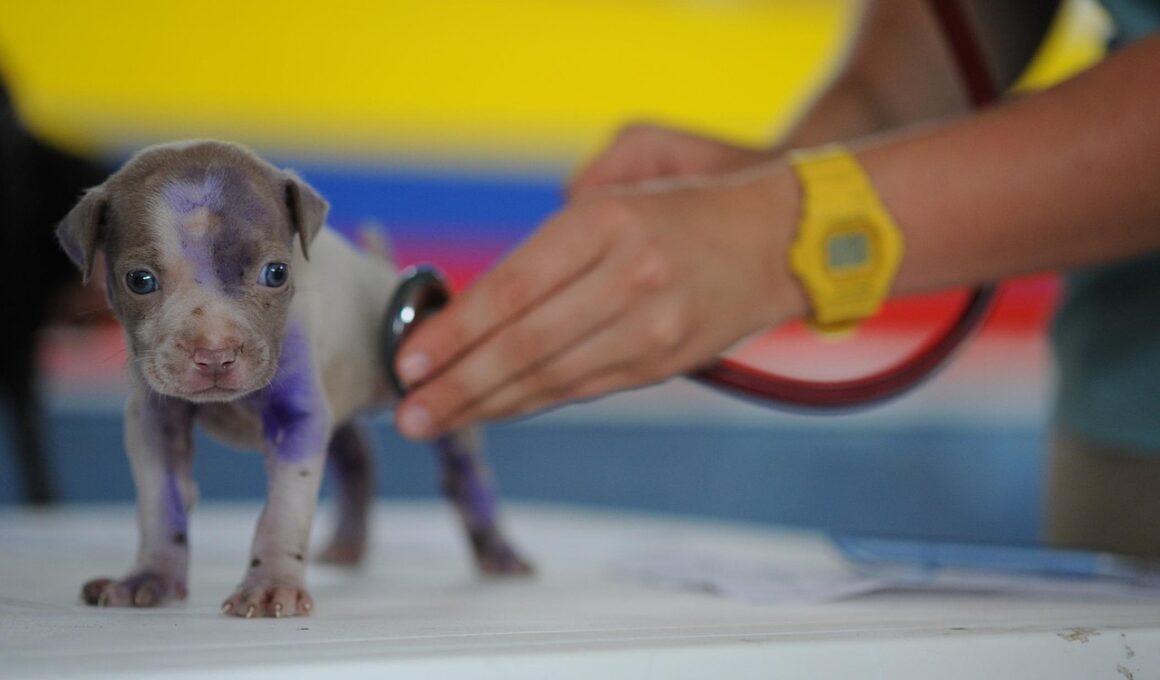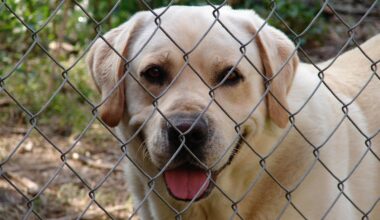The Role of Immunity in Orphaned Puppies and Supporting Their Health
When dealing with orphaned puppies, understanding their immunity plays a pivotal role in their health and development. Puppies rely heavily on their mother’s milk for essential nutrients and antibodies that help fight infections. When they are separated from their mothers, they miss out on these vital components of their immune system. This situation necessitates an immediate intervention to support their overall well-being. Without proper care, these puppies can be at increased risk for various health issues. Puppy milk replacer formulas are readily available, designed to provide the nutritional needs of orphaned puppies. Additionally, maintaining a clean and warm environment is crucial for keeping them safe from infections. A litters’ susceptibility to contagious diseases makes it vital for caretakers to be vigilant about their surroundings. Incorporating a schedule for feeding will tremendously aid in their recovery and growth. Furthermore, offering proper veterinary check-ups can proactively address potential health problems. Without a robust immune system, orphaned puppies cannot thrive. Knowledge about vaccinations and appropriate interventions can go a long way in laying the groundwork for their healthy development and future.
Orphaned puppies face various challenges that test their resilience, especially concerning their immune health. Unlike those raised by their mothers, orphaned puppies do not receive the natural immunity offered through nursing. The lack of colostrum creates an immediate risk for infections and diseases. To mitigate this risk, one must focus on their nurturing. Be aware that they may require more frequent meals, which helps ensure their nutritional intake. Moreover, enriching their environment with proper socialization can aid in boosting their immune responses. The presence of warmth, love, and human interaction greatly enhances their mental well-being, promoting a positive recovery environment. Keeping a log of their weight and development can reveal any weaknesses in their health over time. Puppies are incredibly forgiving and adaptable, but without vigilant care, they can suffer. Beyond nutrition, emotional support and proper handling contribute significantly to a well-rounded care regimen. Learning to observe their behaviors for signs of stress can ultimately lead to quicker resolutions of health issues. Their journey, while challenging, can be positively transformed by a caregiver’s dedication to their health and happiness.
Vaccinations and Preventive Care
Vaccinations play an essential role in safeguarding orphaned puppies’ health during their early stages. Vaccines stimulate the immune system, preparing it to combat various diseases like parvovirus, distemper, and hepatitis. Administering these vaccines at appropriate intervals helps build stronger immunity over time. It is crucial to consult a licensed veterinarian who can prescribe a tailored vaccination schedule for the puppies, ensuring they receive timely shots. In many cases, vaccinations should start around six to eight weeks of age. Knowing when to schedule these vaccinations can be a game-changer in managing their risk of exposure to deadly illnesses. Additionally, maintaining proper hygiene throughout the environment will further enhance the effectiveness of the vaccinations. This includes regular cleaning of living areas and toys to reduce potential contaminations. A proactive approach to health care that includes parasite control is also vital. Internal and external parasites can jeopardize the immune system. Therefore, regular veterinary visits for deworming and flea/tox prevention are paramount. Puppies thrive in a secure and clean environment, and the best preventive care sets them up for long-term health and development.
Nutrition plays a fundamental role in developing a puppy’s immune system and sustaining their overall health. For orphaned puppies, providing a balanced diet rich in proteins, carbohydrates, fats, vitamins, and minerals is essential. Specially formulated puppy milk replacers can serve as the primary source of nutrition during the initial weeks. Following these early days, transitioning to high-quality puppy kibble offers essential nutrients that promote growth and health. Identifying the right brand or recipe tailored for puppies is essential for optimal development. Look for options that list meat as the first ingredient, as this indicates high protein levels necessary for muscle development. Additionally, consider incorporating wet food to enhance hydration and make meals more palatable. Access to fresh water is equally important, ensuring that puppies stay hydrated throughout the day. Some owners may opt for nutritional supplements to support the immune system during particularly vulnerable periods. Consulting a veterinarian can provide the necessary guidance for integrating supplements comprehensively. These considerations combined create a robust foundation for a puppy’s health, fostering strong immune responses and resilience to infections.
Socialization and Mental Health Impact
Socialization stands as an often-underestimated component of puppy development, significantly influencing their immune health. Puppies that interact with diverse environmental stimuli tend to develop better coping mechanisms and a reduced risk of stress-related illnesses. When orphaned, puppies may display apprehension or fearfulness, making gentle socialization critical to their fostering. Techniques such as exposing them to new sounds, smells, and textures can help them grow more comfortable in various situations. Positive interactions with humans and other pets contribute to their emotional well-being and foster a sense of security. Through play and exploration, a puppy’s confidence can enhance their adaptability, allowing their immune system to function optimally. Creating fun and engaging play opportunities promotes both their physical and mental health. Furthermore, establishing a consistent routine allows puppies to predict their environment better, reducing anxiety levels. Engaging with puppies through various stimulating activities can feed their natural curiosity and encourage participation in day-to-day surroundings. Moreover, applying basic commands through positive reinforcement can significantly enhance their bond with humans. This bond ultimately fosters a sense of comfort, enabling puppies to thrive both physically and emotionally.
Monitoring health indicators is critical for orphaned puppy caretakers, allowing for early detection and intervention. Health indicators include weight gain, energy levels, and overall behavior. Rapid weight gain should be a primary focus; healthy puppies should gain approximately 10-15% of their body weight daily during their first few weeks. Regularly weighing the puppies provides measurable insights into their growth progress. Energy levels are another vital sign. Engaging and playful puppies are likely thriving, while lethargy or reluctance to engage may indicate health issues. Careful observation of their behavior can reveal symptoms such as vomiting, diarrhea, or coughing, all points that require prompt veterinary attention. Furthermore, maintaining a health journal detailing feeding schedules, growth metrics, and any behavioral changes can guide owners in making informed decisions. Noting any inconsistencies in health indicators may signal potential issues that require medical intervention. With the right guidance and knowledge, caretakers can navigate these early challenges. Armed with close monitoring, care, and consistent veterinary check-ups, orphaned puppies stand a better chance to overcome adversities and achieve robust health.
Conclusion and Commitment to Care
Caring for orphaned puppies demands dedication and commitment from their caregivers. The journey to raising these vulnerable creatures involves understanding their unique needs, including proper nutrition, vaccinations, and socialization. Throughout their early development, nurturing their immune system must remain a top priority. When adopting orphaned puppies, the responsibilities extend beyond basic feeding; their physiological and psychological health requires sustained attention. Creating a loving and interactive environment fosters positive emotional growth. It also sets the stage for developing a resilient immune system that can ward off diseases as they mature. Collaboration with veterinary professionals ensures adherence to a comprehensive health care plan. Regular check-ups, vaccinations, and health monitoring should form the cornerstone of the commitment to these puppies. Social and mental well-being is equally significant, and investing time in enjoyable interactions benefits their overall health. Each puppy’s unique personality allows for the nurturing of a strong bond, essential for their emotional stability. In conclusion, the role of caregivers is pivotal in ensuring orphaned puppies not only survive but thrive, thus equipping them with a vibrant healthy future.
Taking on the responsibility of raising orphaned puppies serves as a profound act of kindness, demonstrating commitment and love. These vulnerable beings rely on us for their care and nurturing in their formative weeks, reshaping their future. Each aspect of the caregiving journey—from establishing a routine to providing adequate nutrition—has the potential to build their resilience and immunity. Owners should embrace the responsibility wholeheartedly and prioritize their health over time. While challenges may arise, the reward of watching these puppies flourish into healthy adults is immeasurable, bringing endless joy and love into one’s life. Their boundless energy and affection often prove to be a source of immense happiness. The commitment to care for these animals extends beyond basic needs; it involves fostering emotional health and stability. Providing love, patience, and understanding greatly influences their socialization and emotional development. Challenges faced during this journey cultivate invaluable lessons in compassion and resilience for caregivers. Ultimately, the bond formed during these early days can last a lifetime, instilling gratitude in both the puppy and the caregiver. Embracing this journey helps lay a foundation for future interactions and experiences, shaping a dog into a loving companion for years to come.


